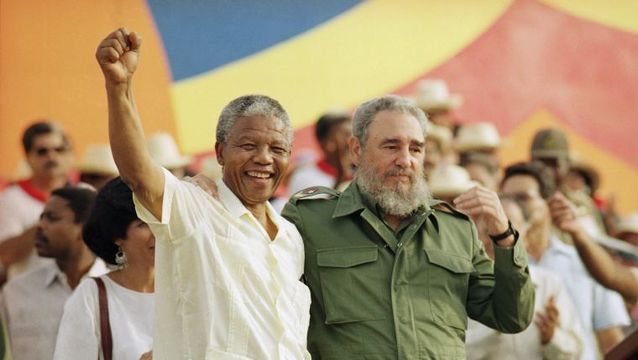

Nelson Mandela and Fidel Castro
This article was published in Avante, the weekly newspaper of the Portuguese Communist Party, on April 13. Translation: John Catalinotto.
The South African Communist Party has reaffirmed its support for convening, later this year, an Africa-Cuba Solidarity Conference.
According to the SACP, this is an important initiative to bring together the progressive forces of the entire African continent in a united action of solidarity with the people of Cuba. They recall that Cuba is “a country that has given so much to the world and received less in return, a country that continues to be the torchbearer of the future of humanity, which resists imperialism and faces tremendous difficulties due to the paralyzing and unjust blockade imposed by the United States of America more than 60 years ago.”
Today, at a time when the U.S. does nothing to hide its recent interest in Africa — a result not of its desire to contribute to the development of African countries but to promote its hegemonic objectives of curbing the influence of China and Russia on the continent — it is useful to remind everyone of Cuba’s participation in the liberation of African peoples from imperialist domination.
Cuba’s deep solidarity with Africa
Right after the triumph of the Cuban Revolution in January 1959, Fidel Castro and his comrades made internationalist solidarity one of the main banners of their struggle to build societies free from exploitation, on the island and in the then so-called Third World.
Moved by these principles, in an altruistic and disinterested way, Cuba aided the progressive forces in Africa fighting for independence and for the national and social emancipation of the peoples, from Algeria to Congo, from Guinea-Bissau to Angola and Mozambique. Cuba did this not only with combatants and weapons, and with doctors, nurses and teachers, but also by educating and training thousands of young Africans on the island of Cuba — which, by the way, it continues to do.
Since 1975, the Cubans have defended, shoulder to shoulder with the patriots led by the MPLA [Popular Movement for the Liberation of Angola], the independence and territorial integrity of Angola, fighting and defeating the invaders from racist South Africa and its allies. Victory in the Battle of Cuito Cuanavale, fought in early 1988 by Angolan and Cuban forces against South African troops, paved the way for the liberation of Nelson Mandela, the dismantling of apartheid in South Africa and the independence of Namibia.
Nelson Mandela and Fidel Castro
Cuba was one of the first countries Nelson Mandela visited after his release from apartheid prisons in 1990. The following year, at Fidel’s invitation, he was on the island and thanked the Cuban people for their solidarity.
Mandela’s words, in Matanzas on July 26, 1991, are still relevant today: “We have waited a long time to visit your country and to express the feelings we have about the Cuban Revolution, about Cuba’s role in Africa, in Southern Africa and in the world. The Cuban people have a special place in the hearts of the people of Africa. Cuban internationalists have made an unparalleled contribution to independence, freedom and justice in Africa by their upright and selfless character.
“From the earliest days, the Cuban Revolution has been a source of inspiration for all freedom-loving people,” said Mandela. “We admire the sacrifices of the Cuban people in maintaining independence and sovereignty in the face of the vicious imperialist campaign orchestrated to destroy the impressive achievements of the Cuban Revolution.”
There are, therefore, justified reasons for progressive Africa to stand in solidarity with Cuba today.
This statement was recently issued by over 30 groups. On Friday, March 28, Dr. Helyeh…
When Donald Trump announced massive tariffs on foreign imports April 2, Wall Street investors saw…
The century-long struggle to abolish the death penalty in the U.S. has been making significant…
Download the PDF May Day appeal to the working class Revolutionary change is urgent! Gaza…
Philadelphia On March 26, the Pennsylvania Supreme Court denied political prisoner Mumia Abu-Jamal permission to…
There are two important and overlapping holidays on April 22: Earth Day and Vladimir Lenin’s…